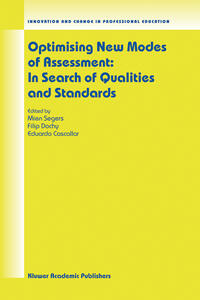
French novelist Marcel Proust instructs us that, “a voyage of discovery consists, not of seeking new landscapes, but of seeing through new eyes.” Nowhere in the practice of education do we need to see through new eyes than in the domain of assessment. We have been trapped by our collective experiences to see a limited array of things to be assessed, a very few ways of assessing them, limited strategies for communicating results and inflexible roles of players in the assessment drama. This edited book of readings jolts us out of traditional habits of mind about assessment. An international team of innovative thinkers relies on the best current research on learning and cognition, to describe how to use assessment to promote, not merely check for, student learning. In effect, they explore a new vision of assessment for the new millennium. The authors address the rapidly expanding array of achievement targets students must hit, the increasingly productive variety of assessment methods available to educators, innovative ways of collecting and communicating evidence of learning, and a fundamental redefinition of both students’ and teachers’ roles in the assessment process.